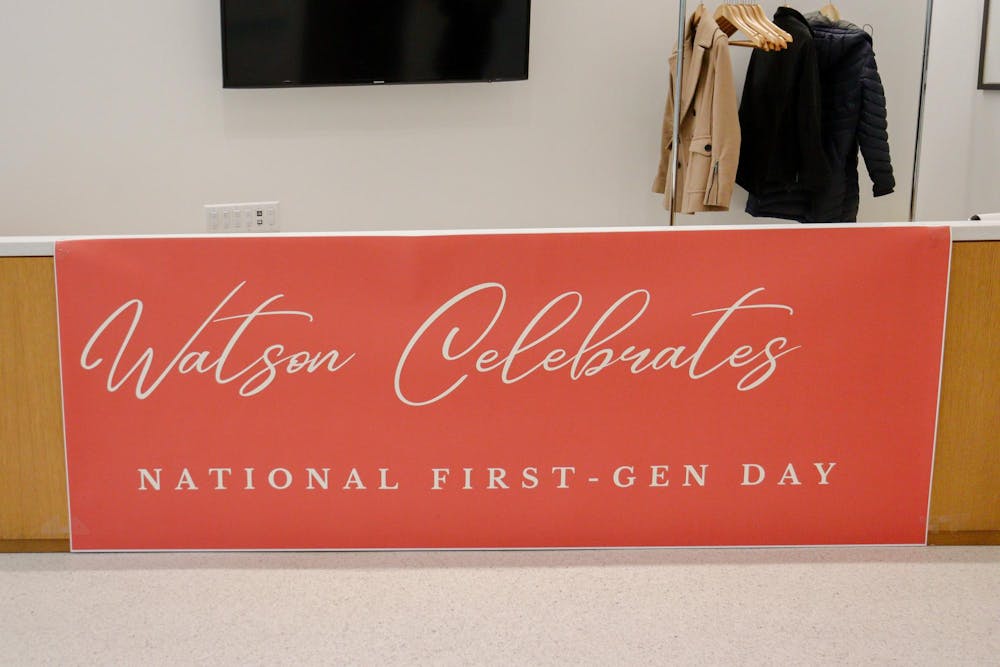In 2017, the Council for Opportunity in Education, in coalition with the Center for First-Generation Student Success, launched the very first First-Generation College Celebration Day, now an annual occurrence. The day marks the anniversary of the signing of the Higher Education Act of 1965, which promoted access to college education.
This year, departments and centers across the University, from the Watson Institute for International and Public Affairs to the Undocumented, First-Generation College and Low-Income Student Center spent Wednesday celebrating Brown’s first-generation students.
Brown defines first-generation students as students who do not have a parent who has completed a four-year college degree. In the 2020-21 academic year, the University reported 13.12% of the undergraduate student body was first-generation. That figure was 15% for the class of 2027.
The U-FLi Center hosted an official celebration Wednesday evening, in collaboration with First-Gens@Brown, the Brown Dream Team and Brown's Questbridge Network. The event, held in the Leung Family Gallery at the Stephen Robert ’62 Campus Center, provided first-generation students a chance to socialize, pick up merchandise and celebrate their accomplishments.
According to Ricardo Ornelas ’25, co-president of First-Gens@Brown, the event aimed to “let people know that there is a community here for them — people they can talk to and make friends with.”
“There’s a big gap between students who are legacy — who have parents and grandparents who came to Ivy Leagues — and students who are here for the first time,” he said. “It's very important to know that there are other people like you, because, in my experience, that can be very isolating.”
Ornelas also emphasized the importance of the stickers, t-shirts and mugs that were being handed out. “It’s a very small thing, I know,” he said. “But when you see somebody wearing that on campus, it lets you know that they're also part of this community that can sometimes feel very small, and it lets you know that it's not as small as it sometimes can feel.”
“There are very few places where U-FLi students have the ability to be together and exist,” said Marissa Guadarrama ’27, who attended the celebration.
“It's really easy to connect with people with a shared identity,” said Sofia Guarisma ’27. “So to have a space like this where we can all talk and don’t have to center it around academics necessarily is really cool.”
On Monday, the U-FLi Center also partnered with the School of Professional Studies to host a celebratory dinner for first-generation students who now attend graduate and medical school programs.
SPS Student Engagement Specialist Morgan Orlandi, who was a first-generation student, organized the event with U-FLi Program Director Julio Reyes and U-FLi Graduate Student Coordinator Neha Lund GS.
“We share the mutual goal of fostering belonging, building community and celebrating our First-Gen graduate students, medical students and residents,” Orlandi wrote in an email to The Herald.
The Watson Institute also commemorated First-Generation College Celebration Day with two events on Wednesday.
The first was an informal celebratory gathering with ice cream sandwiches and merchandise, designed to facilitate community building for first-generation students. The other event was an hour-long panel discussion with Master of Public Affairs students, facilitated by Catherine Rodarte, associate director of admissions and recruitment for the MPA program — who is also a first-generation college graduate. During the event, panelists shared advice on being a first-generation student in a master's program and various other words of wisdom surrounding applications.
Melissa Nicholaus, manager of academic & student affairs for the MPA program and co-chair of the Watson Institute’s Diversity and Inclusion Committee explained that the institute’s efforts to support first-generation students extend beyond the Nov. 8 celebrations.
“We have hosted dinners over the last few years for first-generation students exclusively, Nicholaus said. “Sometimes, we just have dinner and talk, network and share resources. Other times, we invite guest speakers from the first-gen community to talk about what their experiences were like as first-students at Brown and other institutions.”
Guest speakers have included former U.S. Labor Secretary and former Chair of the Democratic National Committee Tom Perez ’83, senior fellow in International and Public Affairs León Rodríguez, along with David Blanding, faculty director of the Master of Public Affairs Program and associate professor of the practice of International and Public Affairs, she added. “This year, (Perez) started a study group, especially for first-gen students, that focuses on leadership.”
Logan Danker ’24, founder of the First-Generation Pre-Law Society, said that while the society doesn’t have specific programming for this year’s National First-Gen Day, it looks forward to celebrating in years to come and appreciates the current effort made by the U-Fli Center and Watson Institute.
The events are “a really great way to network and find community with first-gens who have graduated and established their careers and to learn about how their experiences shaped their careers,” Danker said. “It's a really great way to meet other first-gen students on campus, especially since the first-gen community is so intersectional. It's a great way to form community with other students from different backgrounds and with different lived experiences.”
But Danker believes that significant work remains to support first-generation students.
“I've seen a lot of increased programming and opportunities for first-generation students over my time at Brown, particularly at Watson, and I think other departments across campus could do more to support first-generation students,” Danker said. “Some departments don't discuss first-gen status at all.”
“Especially in the wake of affirmative action's end, admissions at Brown certainly needs to be attentive to its admission policies and application process, and should continue to decrease barriers first-generation, low-income and students of color face,” he added. “They've made a lot of progress with things like making test scores optional, but there's certainly more they can do to make the process more equitable.”

Talia LeVine is a section editor covering arts and culture. They study Political Science and Visual Art with a focus on photography. In their free time, they can be found drinking copious amounts of coffee.





